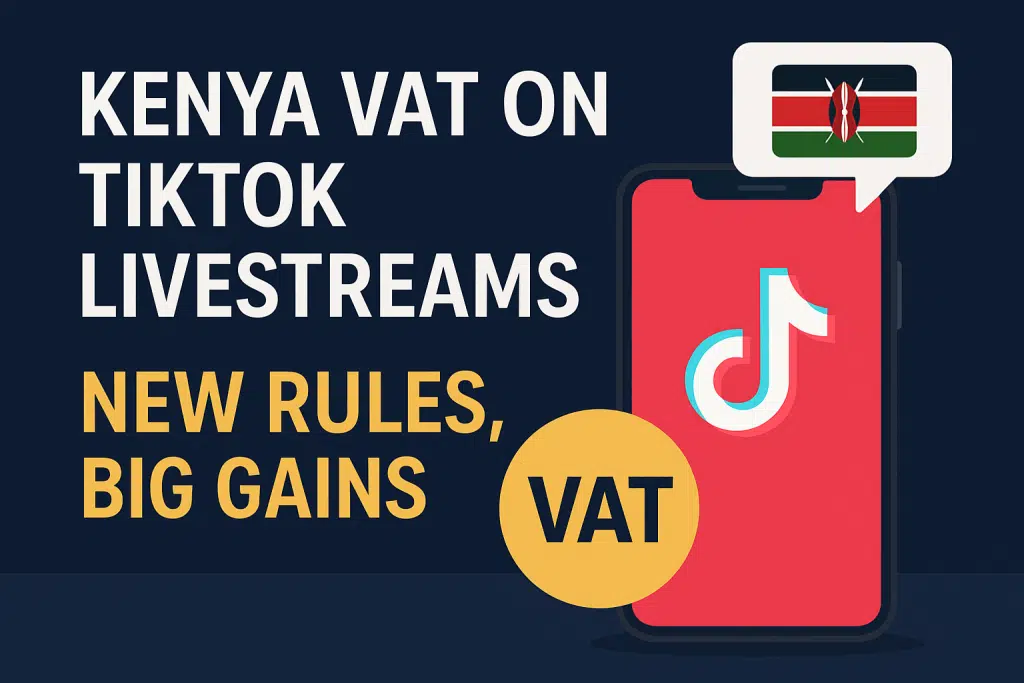Kenya VAT on TikTok Livestreams: New Rules, Big Gains
Kenya’s 2025 tax reforms are set to reshape the digital economy, and TikTok livestreamers are now in the spotlight. With the latest Finance Bill, the Kenya Revenue Authority (KRA) mandates that all TikTok livestreamers registering income from their digital content must be registered for Value Added Tax (VAT).
This means livestreamers must comply with VAT registration and tax payments, ensuring their earnings contribute to the country’s growing digital tax revenue.

This move highlights Kenya’s commitment to regulating online activities and integrating them into the formal tax system. Livestreamers, often seen as informal digital entrepreneurs, will now have clear tax obligations under KRA’s digital transformation efforts. This change promises more accountability and aligns with the country’s drive to boost revenue from the digital sector.
Overview of 2025 KRA Reform
The 2025 KRA reform introduces significant changes to Kenya’s tax landscape, including broader data access by KRA and expanded tax obligations across digital and traditional sectors. It sets clear timelines and updates existing regulations to boost compliance and tap into emerging economic activities like digital streaming.
Key Objectives of the Reform
The reform aims to increase tax compliance by expanding KRA’s access to personal and financial data. This includes information from banks, telcos, and utility companies, enabling KRA to track income more effectively.
Another goal is to close tax gaps, especially among digital economy participants, such as TikTok livestreamers. More taxpayers are expected to register for VAT and income tax, improving government revenue.
The Bill also reduces the Digital Asset Tax rate from 3% to 1.5%, signaling support for blockchain innovation while maintaining revenue collection.
Timeline for Implementation
Key provisions of the Finance Bill 2025 take effect starting July 1, 2025. This includes the removal of exemptions for non-residents earning under KES 5 million, expanding the Significant Economic Presence Tax (SEPT) scope.
KRA’s enhanced data access rights also become active on this date, allowing real-time monitoring of financial transactions.
Businesses and individuals are expected to comply within a short adjustment period, as Parliament fast-tracked the Bill for immediate impact on tax collection.
Comparison to Previous Regulations
Unlike earlier rules limiting KRA’s access to sensitive data, the 2025 reform repeals protections like those in Section 59A(1B) of the Tax Procedures Act. This empowers KRA to request and process personal financial information.
The scope of taxable transactions broadens significantly, now covering all digital platforms and services that were previously exempt or lightly taxed.
Additionally, the Digital Asset Tax reduction contrasts with past higher rates, reflecting a more balanced approach to taxing new technology sectors.
These changes mark a clear shift towards a more inclusive, data-driven tax system compared to past regulations.
VAT Registration for Kenya TikTok Livestreamers
Kenya’s new KRA reform requires TikTok livestreamers to register for VAT if they meet specific conditions. This means livestreamers must understand their tax obligations, registration criteria, and the proper application steps to comply with the law.
Criteria for VAT Registration
TikTok livestreamers in Kenya must register for VAT if their taxable turnover exceeds KES 5 million annually. This threshold includes all income generated from livestreaming activities, such as virtual gifts, sponsorships, and direct payments.
The VAT registration applies to both individual creators and companies providing livestreaming services. Importantly, even informal or casual livestreamers who consistently earn above the set threshold are required to register.
Livestreamers earning below KES 5 million are not obligated but can opt to register voluntarily. Registration ensures compliance with Kenya Revenue Authority (KRA) rules and avoids possible penalties or deregistration risks.
Obligations of Livestreamers
Registered livestreamers must charge a 16% VAT on all taxable supplies, including virtual gifts and advertising revenues earned via TikTok. They are required to issue VAT invoices and keep detailed records of all transactions.
Livestreamers must file monthly or quarterly VAT returns with KRA, depending on the size of their business. Prompt and accurate filing is essential to avoid penalties or suspension.
They also need to maintain proper bookkeeping systems for income and VAT payments. Transparency and compliance with these obligations will protect them from deregistration and financial risks.
Application Process
The VAT registration process for TikTok livestreamers begins on the KRA iTax portal. Applicants must have a valid Personal Identification Number (PIN) and submit essential business details online.
Relevant documents include identification, proof of income, and business details related to their livestreaming activities. KRA may request additional verification to confirm the nature of their earnings.
Once approved, KRA issues a VAT certificate, enabling livestreamers to legally charge, collect, and remit VAT. The suspension of online VAT registrations in recent months has slowed the process but is expected to resume under the 2025 reforms.
How the VAT Will Affect TikTok Content Creators
The new VAT registration rule means TikTok content creators in Kenya will face changes in how they handle their earnings and report income. This shift will impact their monetization processes, how they generate revenue, and introduce some notable challenges.
Impact on Monetization
TikTok livestreamers must now include a 16% VAT on their services under Kenya’s VAT E-Invoicing and Digital Management System. This means creators will have to register with the Kenya Revenue Authority (KRA) to comply with tax regulations.
This VAT is applied on the earnings they generate from their live streams, sponsorships, and other digital services. As a result, creators may see a decrease in their take-home income since a portion now goes to tax payments.
However, formal registration may open doors to more professional opportunities and partnerships with brands that prioritize compliance. This step could legitimize their business and potentially boost long-term income streams.
Changes to Revenue Streams
With VAT now a factor, creators will need to adjust their pricing strategies. Some may raise charges for services such as paid livestreams or exclusive content to cover the tax burden.
Platforms like TikTok may also adjust payout structures to reflect the new tax requirements. This could affect how quickly and how much revenue creators receive.
Legal earnings from ads, sponsorships, and fan donations will all be subject to VAT. Creators might focus more on diversified income sources to offset the tax impact, such as merchandising or offline ventures related to their digital brand.
Monitoring and invoicing digital revenues accurately will become essential for compliance and smooth business operations.
Potential Challenges
Many creators will face difficulties navigating the new tax registration process, including understanding how to file returns and manage VAT payments. Small-scale or emerging creators might find this burdensome.
There is concern that the tax could discourage new content creators from joining the platform or reduce income for those still building their audience.
Administrative costs and time spent on tax compliance may cut into the creators’ focus on content production.
Nevertheless, creators who adapt quickly and seek professional advice can turn this into an opportunity for growth within Kenya’s evolving digital economy.
Guidelines and Compliance for Livestreamers
Livestreamers in Kenya must follow clear procedures to meet new tax rules and stay compliant with the Kenya Revenue Authority (KRA). This involves precise reporting and thorough documentation to ensure smooth VAT registration and payment.
KRA Reporting Requirements
Livestreamers are required to register with the KRA for VAT purposes under the 2025 reform. They must submit regular VAT returns, detailing income generated from livestream activities. Reports should be filed quarterly, highlighting all taxable transactions.
Payments must align with KRA deadlines to avoid penalties. The authority expects complete transparency, including income from gifts, sponsored content, and platform-related earnings. Failure to report accurately can lead to fines or legal challenges.
Using the KRA online portal for returns submission is crucial. Livestreamers should also obtain a valid KRA PIN and keep track of all communications from the authority.
Documentation and Record-Keeping
Maintaining organized financial records is essential for livestreamers under this reform. They must keep copies of invoices, receipts, and contracts related to transactions involving payments or sponsorships.
All income streams, including direct viewer gifts or brand deals, should be logged chronologically. Digital tools such as accounting software can help track earnings and expenses efficiently.
Records must be kept for at least five years, as requested by KRA during audits or inquiries. Good documentation supports accurate reporting and helps resolve any disputes related to VAT compliance promptly.
Opportunities and Benefits for the Kenyan Digital Economy
The new VAT registration requirement for TikTok livestreamers creates clear pathways for enhancing government resources and developing Kenya’s creator economy. It aligns with broader efforts to formalize digital earnings while supporting the growth of local content creators and businesses.
Increased Government Revenue
Registering TikTok livestreamers for VAT under the 2025 KRA reform will expand Kenya’s tax base significantly. The 16 percent VAT on digital services ensures the government collects revenue from a fast-growing and previously under-taxed segment of the digital economy.
This policy helps formalize income streams from digital content creators, allowing better tracking and compliance. The additional revenue can support public services and infrastructure, especially in technology and internet access, which are critical for Kenya’s ongoing digital transformation.
A more transparent tax system encourages fair competition and reduces tax evasion. It also enables the government to allocate funds toward initiatives like the Kenya Digital Economy Acceleration Project, which boosts the digital ecosystem and skills development.
Growth of the Creator Economy
The VAT registration process pushes livestreamers toward formal recognition, which can open doors to partnerships, sponsorships, and monetization opportunities. It encourages creators to professionalize their operations through clearer financial practices and legal compliance.
This reform coincides with growing demand for Kenyan digital content both locally and internationally. TikTok’s expanding user base, estimated at over 10 million Kenyans, fuels market potential for creators. A structured tax environment can build investor confidence and attract support from brands and platforms seeking local expertise.
Formalization also improves access to financial services such as MPESA integration and business training programs. These tools help creators scale their reach, engage audiences more effectively, and diversify income streams, strengthening Kenya’s digital economy from the grassroots.
Global Trends in Digital Taxation
Digital tax policies worldwide are evolving to capture revenues from growing online economies. Countries are balancing new tax models to regulate platforms, content creators, and digital services with the goal of fairness and compliance.
Similar Policies in Other Countries
Several countries have introduced taxes targeting digital services and online earnings similar to Kenya’s approach. For example, France and Italy levy a digital services tax (DST) around 3% on revenues from large tech companies providing digital advertising or online marketplaces.
In the United States, while a federal DST does not exist, some states apply sales tax on digital goods and services. Australia requires GST on imported digital products and platforms, ensuring foreign sellers comply.
Many jurisdictions focus on both resident and non-resident entities, applying taxes to streaming, advertising, and online transactions. This global shift reflects attempts to modernize traditional tax systems for digital trade.
Lessons Kenya Can Learn
Kenya can improve its digital tax regime by adopting clear thresholds to avoid burdening small creators early, a concern seen in other countries. Implementing simplified registration and reporting procedures, possibly through digital platforms like KRA’s iTax, can boost compliance.
Other countries emphasize transparency and education for digital entrepreneurs, helping them understand obligations without stifling innovation. Kenya’s partnerships with major platforms like Google and TikTok could be leveraged further for smoother tax collection and creator support.
Balancing taxation with incentives for digital growth is crucial. Kenya’s reforms could take cues from global best practices to ensure fairness and foster a thriving creator economy.
Future Outlook for TikTok Livestreamers in Kenya
TikTok livestreamers in Kenya are poised to experience significant growth as the platform deepens its presence in the market. The KRA’s VAT registration reform reflects the rising economic impact of digital creators and live streaming as a business.
With over 15 million adult users in Kenya by early 2025, TikTok offers a vast audience for livestreamers. This expansion creates new opportunities for creators to monetize their content through direct sales, brand partnerships, and gifting features.
Key trends shaping the future include:
- Increased integration of live shopping and e-commerce features
- Enhanced tools for real-time audience engagement
- Strategic partnerships with local companies, boosting creator earnings
The expanding digital economy will require livestreamers to adopt professional business practices. Compliance with VAT and other regulations will position them for long-term sustainability and growth.
Live streaming is expected to become a major pillar of the creator economy in Kenya, with TikTok leading innovations. Authenticity and cultural relevance will remain essential for success, especially as the platform continues to attract diverse and mobile-first audiences.
Increased government regulation may encourage more formal partnerships between creators and brands. This could result in improved content quality and new revenue channels for local talent.
The future is dynamic, with TikTok livestreamers in Kenya becoming key players in digital commerce and entertainment throughout 2025 and beyond.






